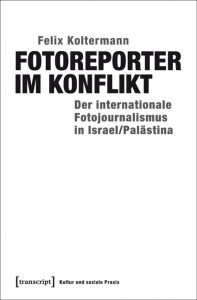Am 9. März 2019 begeht de.hypotheses seinen siebten Geburtstag. Um gebührend zu feiern, st...
Rezension: Felix Koltermann, Fotoreporter im Konflikt
Cover: Felix Koltermann, Fotoreporter im Konflikt. Der internationale Fotojournalismus in Israel/Palästina, transcript Verlag Bielefeld 2017
Kriegerische Auseinandersetzungen, gewaltsame Konflikte und Terrorismus gehören zu den dominanten Themen der weltweiten Berichterstattung. Die dabei vermittelten Bilder prägen unser Wissen und unsere Konfliktwahrnehmung entscheidend. Bisher nähert sich die Kommunikations- und Medienforschung der (foto)journalistischen Praxis zumeist von Seiten des fertig ausgewählten, abgedruckten bzw. ausgestrahlten Medienmaterials. Im Mittelpunkt stehen dabei Forschungsbegriffe wie Nachrichtenfaktoren, Gatekeeping oder Framing.[1] In seiner Dissertation „Fotoreporter im Konflikt. Der internationale Fotojournalismus in Israel/Palästina“ nimmt Felix Koltermann eine neue Perspektive ein. Ihn interessieren nicht die Auswahl der fertigen Bilder oder deren Distribution, sondern die konkreten Produktionsbedingungen von Fotoreporter*innen.
[...]
Quelle: https://www.visual-history.de/2019/03/06/rezension-felix-koltermann-fotoreporter-im-konflikt/
Mittelalter anno 1828
Ein Mord und ein Selbstmord in Braunschweig beschäftigten die städtische Justiz und das La...
readme.txt: „La réalité en partage. Pour une histoire des relations artistiques entre l’Est et l’Ouest en Europe pendant la guerre froide“
Lesen, Schreiben und Publizieren sind die Essenz von „Geisteswissenschaften als Beruf“. ...
Quelle: https://gab.hypotheses.org/6241
Dr. Nikolaus Simmer
Als Dr. Nikolaus Simmer 1940 das Amt des Koblenzer Oberbürgermeisters antrat, zählte er bereits zu den schillerndsten Persönlichkeiten der regionalen „Prominenz“ des Dritten Reiches: Infolge seiner Freundschaft mit Gustav Simon, dem späteren Gauleiter und berüchtigtem Vorkämpfer des Nationalsozialismus im südlichen Rheinland, machte Simmer Karriere: Zunächst Kreisleiter und Vorsitzender der NSDAP-Fraktion im Trierer Stadtrat, zog er 1933 in das Landratsamt des Kreises Trier-Land ein. Zwei Jahre später wurde er Gauwirtschaftsberater von Koblenz-Trier und schrieb sich die Überwindung der Winzernot auf die Fahnen. Simmer wurde zum (Mit-)Organisator der bis dahin größten Weinabsatzkampagne des Dritten Reiches: Er startete im Wettstreit mit Simons pfälzischem Rivalen Bürckel eine reichsweite Sonderaktion zur Förderung des Weinkonsums. Die von ihm initiierte Idee der„Weinpatenschaften“ avancierte zum Kernstück der NS-Weinpropaganda.
Der Referent Dr. Christof Krieger, Leiter des Mittelmosel-Museums in Traben-Trarbach, erforschte in seiner Doktorarbeit an der Universität Trier die nationalsozialistische Weinpropaganda an Mosel, Saar und Ruwer. Die Doktorarbeit wurde im Sommer 2018 publiziert und liegt bereits in zweiter Auflage vor.
[...]
Quelle: http://histrhen.landesgeschichte.eu/2019/03/nikolaus-simmer/
„10 Fragen an Melanie Möller“
Prof. Dr. Melanie Möller | Foto: © privat Melanie Möller studierte Latinistik, German...
Quelle: https://bab.hypotheses.org/4498
Stichtag 5. März 1619
Auch wenn die habsburgische Herrschaft im Verlauf des Jahres 1618 stark unter Druck geraten war, wur...
Wenn die Nationalgarde feiert – eine Quelle zum Karneval 1850
Passend zum heutigen Rosenmontag hatte ich am Wochenende ein Quellbündel zum politischen Karnev...
BBAW sucht eine/n wissenschaftliche/n Mitarbeiter/in (100%, TV-L E 13)
Im Vorhaben „Digitales Wörterbuch der deutschen Sprache“ (DWDS) der Berlin-Brandenburgischen Akademie der Wissenschaften ist zum nächstmöglichen Zeitpunkt die Stelle eines Mitarbeiters / einer Mitarbeiterin im Bereich der gegenwartssprachlichen Lexikographie des Deutschen zu besetzen.
Weitere Informationen und den Text der Ausschreibung finden Sie unter http://www.bbaw.de/stellenangebote, Kennziffer AV/02/2019.
Bewerbungsfrist ist der 16. März 2019.
Quelle: https://dhd-blog.org/?p=11220
Digital History und die archivische Fachdiskussion: Ein blinder Fleck?
Eine notwendig erscheinende Anmerkung anlässlich der jüngst erschienenen Rezension von Guido Koller über die online zugängliche Dissertation von Pascal Föhr: Historische Quellenkritik im Digitalen Zeitalter:
Warum wird die nun schon über zwei Jahrzehnte währende intensive, sich in vielen Publikationen niederschlagende Fachdiskussion der Archivarinnen und Archivare (v. a. aus staatlichen und kommunalen Archiven) über diverse Aspekte der Entstehung, Verwaltung und Archivierung digitaler Unterlagen seitens der digitalen Geschichtswissenschaften nicht wahrgenommen? Zu diesem Ergebnis muss man jedenfalls kommen, wenn man die unzutreffende und völlig unzureichende Darstellung von Pascal Föhr (S. 17, S. 139f.) zur Kenntnis nimmt; gleiches gilt für Guido Kollers eigene Publikation „Geschichte digital“.
Was ist mit den Ergebnissen des Arbeitskreises „Archivierung von Unterlagen aus digitalen Systemen (AUdS)“, einem Netzwerk von Archivarinnen und Archivaren aus öffentlichen Archiven, das seit 1997 (!
[...]
